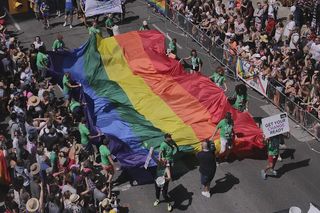Psychoanalysis
Stonewall’s 50th Anniversary and an Overdue Apology
How the mental health professions evolved on LGBTQ rights.
Posted June 21, 2019 Reviewed by Devon Frye

By Jack Drescher, M.D.
This month marks the 50th anniversary of the Stonewall uprising in New York City, when patrons of that now-historic establishment fought back against anti-LGBT prejudice, hatred, and oppression.
Sadly, some responsibility for that era’s oppression can be laid at the doorstep of the American psychoanalytic establishment. In 1969, with rare exceptions, psychoanalytic theorizing about LGBT people consisted of little more than negative and offensive caricatures. Since homosexuality was, at the time, considered a mental disorder, the analyst would have tried to cure that disorder. A gay person seeking help from a psychoanalyst during that period would very likely have been offered now-discredited conversion therapy.
Freud on Homosexuality
Sigmund Freud, the father of psychoanalysis, did not think homosexuality was an illness, by which he meant a “neurotic conflict.” He also signed a 1930 petition to decriminalize homosexuality in Austria and Germany. Nevertheless, Freud thought of homosexuality as a “developmental arrest,” a kind of psychological immaturity in comparison to “mature,” adult heterosexuality.
While calling someone “childish” may not be as offensive as calling someone “sick,” neither label is respectful to gay people.
Psychoanalysis on Homosexuality Back Then
Later psychoanalysts took this disrespect even further, classifying homosexuality as “phobia,” “sexual deviation,” “sociopathic personality disturbance,” and “neurosis.” Transgender presentations were simply regarded as another version of homosexuality.
This theorizing led to homosexuality’s inclusion as a sexual deviation in the American Psychiatric Association’s (APA) 1968 edition of the Diagnostic and Statistical Manual (DSM). Historian Martin Duberman and gay psychoanalyst Richard Isay documented their painful, failed attempts to cure their homosexual orientation with psychoanalysis.
This is why, following the Stonewall riots, the early LGBT civil rights movement saw psychiatry—at the time mostly represented by psychoanalytic theorizing—as the enemy. In May 1970, activists disrupted the annual meeting of the American Psychiatric Association (APA) in San Francisco and took over scientific meetings devoted to “curing” homosexuality. They initiated a three-year process within APA that led to the removal of “homosexuality per se” from the DSM.
After APA’s Board of Trustees voted for removal in December 1973, the psychoanalytic community strongly objected. Having failed to make their case to keep the diagnosis in scientific committees and symposia, psychoanalysts meeting at the Waldorf-Astoria collected 200 signatures to petition the APA. For what purpose? To put the APA Board’s decision to a vote of the entire membership. In a 1974 vote, almost half of APA’s voting members participated. Fifty-eight percent voted to support the APA decision.
In the two decades that followed, meetings and journals of the American Psychoanalytic Association (APsaA) continued presenting and writing about homosexuality as a mental disorder. The organization also refused to allow openly gay and lesbian mental health professionals to train at affiliated centers.
Psychoanalysis Today
All that would change. In 1991, after the threat of an anti-discrimination lawsuit, APsaA issued an anti-discrimination statement allowing training of gay and lesbian psychoanalysts. In 1992, the statement was amended to prohibit discrimination in selecting teaching faculty.
APsaA, thanks to the pioneering efforts of Ralph Roughton, went on to make internal changes to add substance to their words. A group known today as the Committee on Gender and Sexuality was formed; one culmination of their early efforts took place in 1997 when APsaA became the first mainstream mental health organization to endorse marriage equality. In 1998, the Ralph E. Roughton Paper Award was established for an original, scholarly contribution to the understanding and treatment of LGBTQ people.
In the years that followed, APsaA has gone on to take positions supporting LGBTQ military service, against conversion therapy, ending sexuality-based bullying and harassment, and endorsing marriage equality.
Rather than trying to "cure" gay people of homosexuality or trying to figure out “why” people are gay, contemporary psychoanalytic practitioners now focus on helping LGBT people live authentic lives.
A Long Overdue Apology
On June 6th, the New York City Police Commissioner, James O’Neill, apologizing for the police raids at Stonewall Inn, declared, “The actions taken by the NYPD were wrong, plain and simple. The actions and laws were discriminatory and oppressive. And for that, I apologize.”
In that same spirit, when asked about psychoanalysis’s role in those historical events, APsaA President Lee Jaffe, M.D., offered the following apology at their Annual Meeting in San Diego on June 21: “Regrettably, much of our past understanding of homosexuality as an illness can be attributed to the American psychoanalytic establishment. While our efforts in advocating for sexual and gender diversity since are worthy of pride, it is long past time to recognize and apologize for our role in the discrimination and trauma caused by our profession and say ‘we are sorry.’”
About the Author: Jack Drescher, M.D., is Co-Chair of the Committee on Public Information of the American Psychoanalytic Association. He is a Training and Supervising Analyst at the William Alanson White Institute, a Faculty Member of the Columbia Center for Psychoanalytic Training and Research and Clinical Supervisor and Adjunct Professor at New York University’s Postdoctoral Program in Psychotherapy and Psychoanalysis.
References
Bayer, R. (1987). Homosexuality and American Psychiatry: The Politics of Diagnosis. Princeton, NJ: Princeton University Press.
Drescher, J. (2008). A history of homosexuality and organized psychoanalysis. J. American Academy of Psychoanalysis & Dynamic Psychiatry, 36(3):443-460.
Drescher, J. & Merlino, J.P., eds. (2007). American Psychiatry and Homosexuality: An Oral History. New York: Routledge.




